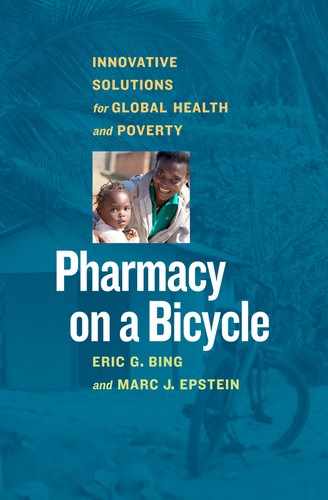Preface
Pharmacy on a Bicycle highlights the impact that can be created in global health when diverse groups of innovative and entrepreneurial people come together to achieve a common goal. This book was created in the same way, with different people with diverse perspectives from various parts of the world coming together for a shared and higher purpose.
As authors, we have very different backgrounds, education, and experience—a perfect combination to engage in this project. Marc has been a business school professor for most of his career with extensive work in both the for-profit and not-for-profit sectors. He has written books on innovation, governance, and accountability along with corporate sustainability and social, environmental, and economic impacts. He teaches a class called “Commercializing Technology in Developing Countries” that focuses on health. He takes his students to Rwanda or Liberia each year to find commercial solutions to the health and education challenges of the global poor.
Eric is a physician with an MBA who combines his training in health and business to help solve global health challenges. He leads global health at the George W. Bush Institute, a presidential center designed to move ideas into action, and is a professor of global health at Southern Methodist University. He has taught health care management, consulted for health ministries, and created and directed nongovernmental organizations and research centers in Africa, Latin America, and the United States.
We came together combining our joint competencies, education, and experience to try to alleviate suffering and poverty. Although our skills are quite different, we both recognized that the solutions to global health problems are less about the need for new scientific discoveries and more about logistics, dissemination, and implementation of what we already know. We can cure many of these diseases, yet people throughout the world still are dying.
Though Pharmacy on a Bicycle represents our own views and we are solely responsible for its content, we are indebted to many people who have worked hard to help the higher purpose of this book to save lives. We would especially like to thank our research and editing team, including our research and production manager Suraj Patel (George W. Bush Institute) and editor Troy Camplin, as well as research assistants Amit Suneja and Sneha Rao (Rice University), Tara Stevenson, Carina Heckert and Jessica Lott (Southern Methodist University), and Bryan Erickson and Devi Nair (Harvard University). In addition, we would like to thank health policy consultant Sharif Sawires for his scientific contribtions and valuable insights. The hard work and dedication of this team cannot be overstated.
We are also incredibly grateful to many colleagues and friends for conversations on multiple continents over the years in which we’ve discussed and debated some of the ideas presented in this book, including Ahmed Abajobir, Jan Agosti, Ricardo Araya, Jerry Bender, Joan Benson, Trista Bingham, Deborah Birx, Kerri Briggs, Barbara P. Bush, Lisa Carty, David Chard, Karen G. Cheng, Thomas J. Coates, Pamela Collins, Cynthia Davis, Mark Dybul, Freddy Ford, Christopher H. Fox, Catherine Freeman, Gus Gill, Mike Grillo, Charles Hilliard, Jon Huggett, Brooke Jenkins, Jose Jeronimo, Wilbert Jordan, David Kanouse, Sharon Kapambwe, Jim Yong Kim, John Kraemer, Lejeune Lockett, Anne MacDonald, Elizabeth Marum, Larry Marum, Katrina McGhee, Phil Meyer, Kristie Mikus, Brendan Miniter, Mulindi Muanahamuntu, Charles Murego, Suku Nair, Maria Oden, Doyin Oluwole, Dan Ortiz, Allan Pamba, Groesbeck Parham, Nia Parson, Vikram Patel, Willo Pequenat, Rebecca Richards-Kortum, British Robinson, Mary Jane Rotheram, Amanda Schnetzer, Carolyn Smith-Morris, Julia Taylor, Gina Tesla, Edwin Tomyoy, Charity Wallace, Jane Wantgui, and Gail E. Wyatt. At times, a simple question or comment or quizzical look from one of them would prompt us to think deeper, and we discovered new insights in the process.
We are appreciative of the many students, staff, faculty, and administration of Southern Methodist University, Rice University, Charles Drew University of Medicine and Science, and the George W. Bush Institute who have supported our efforts over the years. And we sincerely appreciate the Starkey Hearing Foundation, Bill and Melinda Gates Foundation, National Breast Cancer Foundation, Sharad Lakhanpal, and Gregg Mamikunian, as well as the Bush Institute development team, for their generous support of global health at the Bush Institute, which allowed Eric the time to research and write this book; and Rice University, for support of Marc’s research and teaching activities in social entrepreneurship in developing countries.
Eric would particularly like to thank President George W. Bush and Mrs. Laura Bush for their leadership in global health and their encouragement and support of his global health efforts; and Mark Langdale and James K. Glassman for their leadership at the George W. Bush Presidential Center and Institute and support of his efforts as well.
We are grateful to Neal Maillet and the terrific team at Berrett-Koehler Publishers, whose efforts greatly improved this book.
And finally, we are particularly grateful to our families, who, whether in person or in spirit, have unconditionally loved, supported, and inspired us. In particular, we thank Marc’s family: Joanne Epstein, the Firestone family (Simcha, Debbie, Emily, Noah, and Maya), and the Zivley family (Scott, Judy, Amanda, and Katie). As well as Eric’s family: Randy Kender, Bryan Erickson, Henry, Lorraine, Diana, Donald and Lorrie Bing, and Cora Bailey. This book and our lives are stronger and more complete because of them.
Eric G. Bing
Dallas, Texas
Marc J. Epstein
Houston, Texas
February 2013
